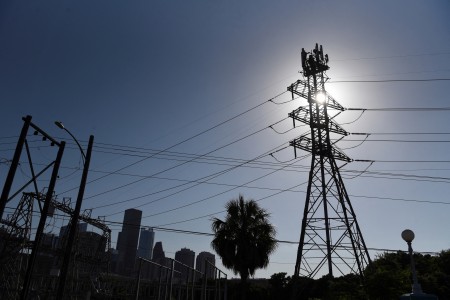By Scott DiSavino
(Reuters) – The Texas power grid operator is expecting electricity use will break an all-time demand record on Tuesday as homes and businesses crank up air conditioners to escape a heat wave stretching across the state.
Texas’ surging population growth in recent years and its status as a hot spot for some of the most energy-intensive industries, including data centers and cryptocurrency mining, have ramped up power use in the state and increased stress on its vulnerable electrical grid.
After breaking peak-demand records several times in April and May, Texas peak power demand is projected to rise to 85,989 megawatts (MW) on Tuesday, which would top the grid’s all-time peak of 85,508 MW set on Aug. 10, 2023, according to the Electric Reliability Council of Texas (ERCOT).
ERCOT, which operates most of the grid for 27 million customers, said it expected demand would ease to 85,921 MW on Wednesday.
The grid operator also said the power network was operating normally, with enough supply available to meet expected demand.
One megawatt can power 800 homes on a normal day but as few as 250 on a hot summer day in Texas, when homes and businesses turn up air conditioners.
Temperatures in Houston, the state’s biggest city, are expected to reach 103 degrees Fahrenheit (39 degrees Celsius) on Tuesday before easing to 100 F (38 C) on Wednesday, according to AccuWeather meteorologists.
That compares with a normal high of 95 F (35 C) for this time of year.
Next-day power prices at the ERCOT North Hub, which includes Dallas, jumped about 157% to a two-week high of around $102 per megawatt hour for Tuesday, according to LSEG pricing data.
That compares with an average of $57 per MWh so far in August, and $33 so far this year, $80 in 2023 and $66 over the prior five years (2018-2022).
Real-time prices in ERCOT soared to almost $1,600 per MWh during one 15-minute interval at around 6 p.m. local time on Monday, according to the grid operator’s website.
So far on Tuesday, however, real-time prices have only hit a high of $32 per MWh during one 15-minute interval.
(Reporting by Scott DiSavino; editing by Laila Kearney and Jonathan Oatis)


